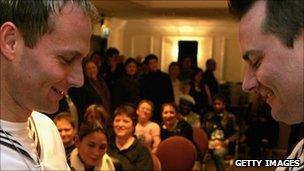Church of England clergy challenge civil partnership stance
- Published

The law has permitted places of worship to host civil partnership ceremonies since December
A letter signed by 120 clergy is calling for the Church of England to reverse its ban on civil partnership ceremonies being held in churches.
The signatories, from the diocese of London, want discretion to uphold loving homosexual relationships.
It is the first sign of significant resistance within the Church to its refusal to permit civil partnership ceremonies in Anglican churches.
The law, external has allowed them in English and Welsh places of worship since December.
In their letter to the London diocese representatives on the General Synod, the signatories stopped short of calling for same-sex marriage.
However, they said they should be given the same discretion in deciding whether to hold civil partnerships in church as they currently have in deciding whether to remarry divorced people.
One of the signatories said they were dismayed at having to deny "the Church's fullest ministry" to increasing numbers of gay couples with loving relationships, said BBC religious affairs correspondent Robert Pigott.
The Church said in December it would not host civil ceremonies, just as a "gentlemen's outfitter is not required to supply women's clothes".
'Dictatorial, homophobic'
Secretary general William Fittall wrote, external that no religious premises would be allowed to host the registration of civil partnerships without written permission from the general synod - the Church's governing body.
The government said no religious group would be forced to hold ceremonies.
However, the Church's stance angered pressure groups and gay rights campaigner Peter Tatchell urged clergy to defy the ban, which he called "dictatorial and homophobic".
The government will open a consultation on the issue of same-sex marriages - as opposed to civil partnerships - in March.
A consultation on the subject by the Scottish government ended in December.
On Wednesday, more than 50 people protested outside York Minster at comments made by the Archbishop of York on same-sex marriage.
Dr John Sentamu had told the Daily Telegraph that marriage must be between a man and a woman, adding it was not "the role of the state to define what marriage is".
Civil partnerships give same-sex couples the right to the same legal treatment across a range of matters as married couples but the law does not allow such unions to be referred to as marriages.
- Published3 December 2011
- Published1 December 2011
- Published27 October 2010